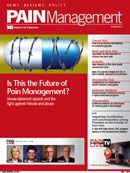Publication
Article
Pain Management
Approval of New Fast-acting Fentanyl Formulations Offers Relief to Patients Suffering from Breakthrough Pain
Indicated in patients who are already receiving, and are tolerant to, opioid analgesics for their underlying persistent cancer pain. Two new, fast-acting forms of fentanyl were approved by the FDA this year for the management of breakthrough cancer pain. Abstral, a transmucosal tablet, was approved in January and Lazanda, a nasal spray, was approved in June.
Two new, fast-acting forms of fentanyl were approved by the FDA this year for the management of breakthrough cancer pain. Abstral, a transmucosal tablet, was approved in January and Lazanda, a nasal spray, was approved in June. “These types of analgesics are another step forward in helping improve functioning in patients with breakthrough pain,” said Srinivas R. Nalamachu, MD, of the International Clinical Research Institute in Overland Park, Kansas, who has researched the long-term effectiveness and tolerability of sublingual fentanyl for the treatment of breakthrough cancer pain (http://bit.ly/uQeCww).
Both drugs are alternatives to previously approved forms of fentanyl, including the oral tablet Fentora, the fentanyl buccal soluble film Onsolis, and the oral swab Actiq, which was approved more than a decade ago.
Breakthrough pain in cancer is an intense, sudden pain that is often unpredictable and debilitating, and occurs despite opioid therapy. It often has a rapid onset, usually reaching maximum intensity within five minutes and lasting 30-60 minutes per episode. Patients report that it negatively affects their ability to engage in their usual activities of daily living and diminishes their overall quality of life (http://bit.ly/v1STu1). On average, breakthrough pain affects more than half of patients with cancer (http://bit.ly/9I9Zk4).
"These types of analgesics are another step forward in helping improve functioning in patients with breakthrough pain."
—Srinivas Nalamachu, MD
Abstral is a rapid-onset opioid that is administered as a quick-dissolving tablet placed under the tongue. It is absorbed through the mucous membranes of the mouth, gums, and tongue to provide fast relief during a sudden attack of cancer-related pain.
“More than anything else, the development of these drugs is important because of the quick onset of pain relief,” said Nalamachu. “It is very fast, under 15 minutes, and patients can get relief and quickly get back to doing the things they need to do in their lives.”
Abstral is approved for cancer patients over the age of 18 who already use opioid pain medication around the clock and are experiencing periodic breakthrough pain.
The recommended initial dose of the drug is a single 100-μg tablet. If adequate analgesia is achieved within 30 minutes of administration of the 100-μg tablet, subsequent episodes of breakthrough pain should be treated with the same dose. If adequate analgesia is not achieved after the initial dose, the patient may use a second Abstral dose after 30 minutes as directed by a health care provider. No more than two doses of Abstral may be used to treat an episode of breakthrough pain, and patients must wait at least two hours before treating another episode of breakthrough pain. The Abstral dose should be escalated in a stepwise manner, increased by 100-μg multiples up to 400 μg, over consecutive breakthrough episodes until adequate analgesia with tolerable side effects is achieved (http://bit.ly/tf9hLm).
Side effects associated with the use of Abstral include nausea, drowsiness, headache, and constipation. The FDA has also warned that the risk of death had been cited in studies of similar immediate-release fentanyl products. The deaths occurred as a result of improper patient selection and/or improper dosing, the FDA said (http://1.usa.gov/ekKtiP).
FDA approves first fentanyl nasal spray for breakthrough pain
Lazanda is supplied as a nasal spray, and, like Abstral, the appropriate dose must be determined by dose titration and is based on the individual patient’s effective and tolerable dose. The initial dose for patients, including those switching from another fentanyl product, is one 100-μg spray, which is one spray in one nostril. If adequate analgesia is obtained within 30 minutes of administration of the 100-μg single spray, subsequent episodes of breakthrough pain should be treated with the same dose. If adequate analgesia is not achieved with the first 100-μg, dose, doses are escalated in a stepwise manner over consecutive episodes of breakthrough pain until adequate analgesia with tolerable side effects is achieved. As with Abstral, patients must wait at least two hours before treating another episode of breakthrough cancer pain with Lazanda. Potential side effects include nausea, vomiting, and dizziness (http://bit.ly/vz6zuS).
Nalamachu said that being able to offer fentanyl in various formulations is important to tailor treatment to patients’ needs. A patient with a head or neck cancer, for example, can suffer from a dry mouth and thus is not a good candidate for transmucosal tablets, he said, adding, “And a patient with allergy problems is not the best candidate for the nasal spray.”
Abstral and Lazanda are schedule II controlled substances and are only available through health care professionals and pharmacies registered in the agency’s risk evaluation and mitigation strategy (REMS) program.
